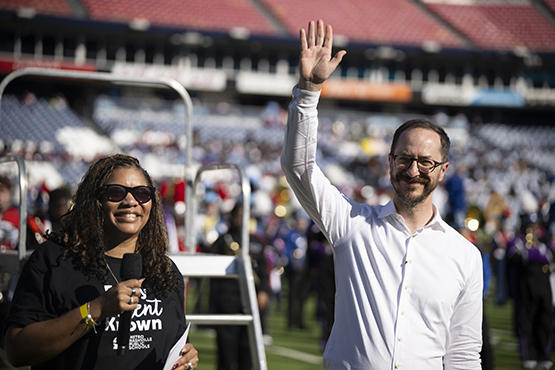From improving the learning environment for students to upgrading beloved third spaces, Mayor Freddie O’Connell’s proposed third capital spending plan continues the administration’s work to improve how Metro Nashville delivers great service and great opportunities for all Nashville residents.
“This capital spending plan helps us respond to our growth by allowing departments to nimbly address needs that ensure Metro can continue to deliver great customer service to Nashvillians,” Mayor Freddie O’Connell said. “Funding from this capital spending plan helps us do the little things well and keep up with maintenance that may not grab headlines, but by doing the little things well, we can better execute on the big ideas and challenges ahead.”
Schools
The largest portion of the capital spending plan will go toward improvements in Nashville Public Schools. Metro Schools will receive $103 million to continue modernizing its facilities and to ensure students and teachers have a great learning environment.
Funding will support a new elementary school in Antioch ($28.5 million), initiate design for renovations to McGavock High School ($8 million), district-wide major maintenance projects ($31.5 million), computer replacement projects ($10 million), high school competition turf fields ($8.2 million), energy-saving solar installations at schools ($3.2 million), safety and security upgrades ($2 million), and more.
How Nashville Moves
The capital spending plan addresses acute infrastructure needs that complement the implementation underway with the Choose How You Move program. Sidewalks, bikeways, and safety initiatives will combine with the work underway through Choose How You Move to address both long-term and short-term community needs.
The majority of funding for Nashville Department of Transportation (NDOT) goes to road repair ($49.9 million) to allow the department to patch potholes and pave roads in need of improvement. Keeping roadways in good condition is important to avoiding more expensive roadway issues in the future. In the past two years, NDOT has patched 70,000 potholes on Davidson County streets.
Another $7.8 million will go towards sidewalks, $4 million to signal upgrades, and $3 million for active transportation improvements and bikeways. With the benefit of the long-term planning done through Choose How You Move, the capital spending plan helps Metro respond to immediate needs as they occur.
In addition to the investments in NDOT to help Nashville respond to its growth and help us all better move around the city, WeGo Public transit (MTA/RTA) will receive more than $3 million to replace aging buses and upgrade their paratransit fleet. These purchases are in addition to new buses funded through Choose How You Move which will enable more transit service expansion.
How Nashville Works
Nashvillians will soon see progress toward a new Richland Park Library on Charlotte Avenue with $1.6 million from the capital spending plan supporting design completion and early construction work at the new facility. The capital spending plan also funds design for a replacement of West Park ($2 million), continued investments for replacements for the Metro Public Health Department Woodbine and Metro Animal Care and Control facilities, improvements to greenways ($4 million), new roofing at numerous parks locations ($5 million), and open space acquisition ($1 million).
Mayor O’Connell’s capital spending plan is also making a $18 million investment in a new Emergency Communications Center which will also house the Office of Emergency Management and will invest in upgraded communications for emergency responders ($5.9 million). Work will begin in south Nashville (District 31) on a new fire station ($1 million). This comes on the heels of a new truck company that is also now serving south Nashville.
The capital spending plan also funds significant maintenance, planning, and construction projects at multiple Metro Nashville facilities.
How Nashville Grows
The East Bank Development Authority will see a nearly $38 million investment for foundational work needed to advance critical infrastructure efforts ahead of the planned start of construction by development partner The Fallon Company in 2026.
The current East Bank infrastructure and street grid include complex arrays of mismatched design that need to be modernized and standardized to accommodate the denser redevelopment of the area. The work completed in the last year is some of the most critical, yet unseen, infrastructure upgrades needed to support the future East Bank neighborhoods that thousands of Nashvillians will call home in the coming years.
Elsewhere, Metro Water Services will use $16 million for stormwater management, construction, and maintenance to help the city better handle today’s intensifying weather events. As Nashville grows, investments in the often unnoticed but always vital stormwater system ensure our infrastructure keeps up with our growth.
Waste Services is also getting an investment of $1.6 million to initiate its first full convenience center in West Nashville.
“Our latest capital spending plan represents a disciplined approach to funding the increasing needs of our growing city that is fiscally responsible and maintains our strong financial rating,” said Finance Director Jenneen Reed.
Mayor O’Connell is filing the capital spending plan with the Metro Council on Friday for initial consideration at the Council’s December 4, 2025, meeting.



